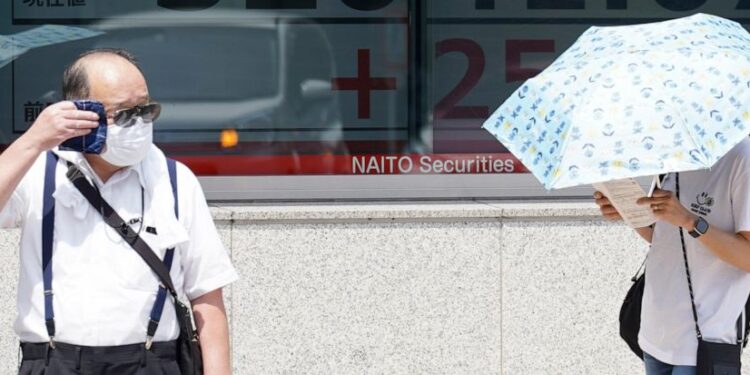Shares are mostly lower in Asia as optimism over a Wall Street rally is countered by worries about the Chinese economy
Shares were mostly lower Tuesday in Asia as optimism over a Wall Street rally was countered by worries about the Chinese economy.
Shares rose in Tokyo but fell in most other regional markets. Hong Kong’s benchmark lost nearly 2% as it reopened after a weather related closure on Monday.
On Monday, China reported weaker economic growth for the spring than most economists had expected. Its recovery following the removal of anti-COVID restrictions has fallen short of forecasts. That has helped to limit inflation globally but it also is hindering a main engine of growth for the world economy.
Japan’s benchmark Nikkei 225 rose 0.2% to 32,438.27. Markets in Tokyo also were closed Monday, for a holiday. Australia’s S&P/ASX 200 shed 0.3% to 7,276.00. South Korea’s Kospi lost 0.5% to 2,606.19. Hong Kong’s Hang Seng gave up 1.9% to 19,037.07, while the Shanghai Composite dropped 0.3% to 3,200.76.
On Wall Street, the S&P 500 rose 0.4% to 4,522.79, its highest closing level in 15 months. The Dow Jones Industrial Average gained 0.2% to 34,585.35, and the Nasdaq composite climbed 0.9%, to 14,244.95.
In the United States, the economy has remained resilient, avoiding recession so far despite much higher interest rates meant to push down high inflation.
This upcoming week will offer more details on how the economy has affected companies as corporate earnings season ramps up. This week, nearly 60 companies in the S&P 500 are scheduled to report how much profit they made in April-June.
Expectations are modest. Analysts are forecasting the worst drop for earnings per share among S&P 500 companies since the pandemic was pummeling the economy in the spring of 2020, according to FactSet. They’re also forecasting a third straight quarter of declines in profits.
Several banks and Delta Air Lines helped kick off the reporting season last week with reports that were better than feared. This upcoming week will feature reports from Bank of America, Netflix and Tesla, among others.
While last week’s earnings reports offer just a small sample size, the season’s start is encouraging because of how strong corporate forecasts have generally been for future results, according to strategists at Bank of America.
“We expect the momentum to continue,” the strategists led by Savita Subramanian wrote in a BofA Global Research report. They expect earnings declines for S&P 500 companies to bottom out this reporting season.
Also coming up this week will be the latest monthly update on sales at U.S. retailers. Strong spending by U.S. consumers has been one of the main reasons for the economy’s resilience, driven by a remarkably sturdy job market.
The stock market‘s big run has critics warning that it is not a certainty the economy will avoid a recession, that inflation will continue to coast lower and that corporate profits will recover.
The wide expectation is for the Fed to raise rates at its meeting next week, which would take the federal funds rate to its highest level since 2001. But the hope among traders nevertheless is that will be the final hike of this cycle.
Easier interest rates help all kinds of stocks, but investors see big technology and other high-growth stocks as some of the biggest beneficiaries.
Several helped the market to rise Monday, including Tesla, which climbed 3.2%. Tesla also said over the weekend that its first production Cybertruck electric pickup has rolled off the assembly line, though that was nearly two years behind the original schedule.
In energy trading, benchmark U.S. oil added 29 cents to $74.44 a barrel in electronic trading on the New York Mercantile Exchange. It dropped $1.27 to $74.15 per barrel on Monday. Brent crude, the international standard, rose 27 cents to $78.77 per barrel.
In currency trading, the U.S. dollar fell to 138.36 Japanese yen from 138.71 yen. The euro cost $1.1252, up from $1.1240.
Source: abcNEWS




Recent Comments